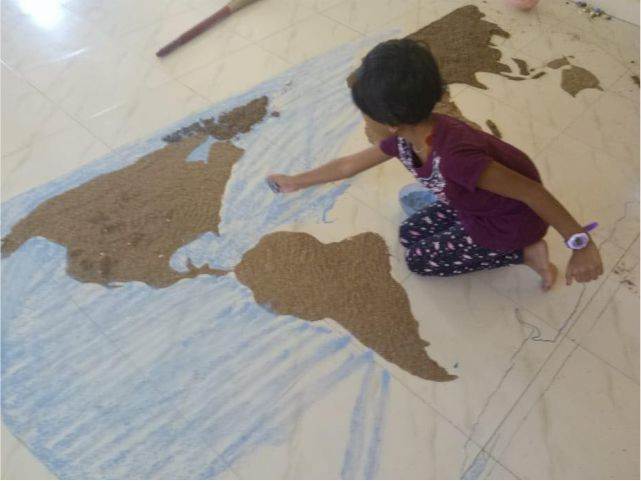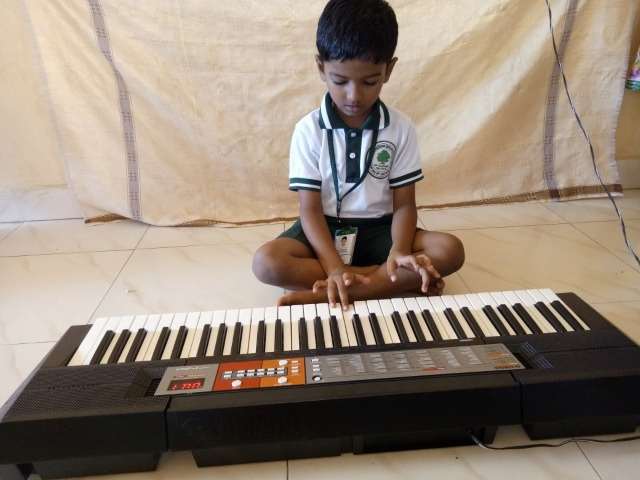Cultural Studies and Geography Curriculum
Knowledge of Culture and Geography
Understanding and Enjoying the Wondrous World We Live In
At Vruksha – International School of Montessori, we help our
students acquire the essential knowledge, thinking skills, and strength of character required
to flourish as joyous children today, and as successful adults tomorrow. We want to equip them
with a wealth of knowledge that enables them to understand and delight in both the wondrous
world around them, and their personal identity within.
The Cultural Subjects in our Montessori preschool classrooms provide our students with a first
exposure to the many areas of knowledge they will encounter later on – and enable them to acquire
an early interest in learning about the world, its natural wonders, its people, history and culture,
its music and art.
Historically, many of mankind’s greatest thinkers were travellers. Through their travels, they
acquired a deep interest in people and societies, in landforms and physical materials. This knowledge,
gathered through experience, formed the foundation for their later work in history, science,
literature, business. So it is with the Vruksha Montessorian student. The Montessori cultural
studies offer each preschool child the opportunity to “travel” and explore the world from within
the classroom, and to thereby acquire the knowledge base that will inform, motivate, and ground
the systematic studies they will pursue in elementary school and beyond.
By starting early, and drawing on the child’s natural interests, we enable our students to gain a head
start in numeracy and, more importantly, a confidence in their own ability to do math, and to do it
well. Instead of the math phobias that many children acquire in elementary school, where arithmetic
operations are introduced as abstract, mechanistic operations to be memorized even if not understood,
our 6-year-old students master the basics of arithmetic using concrete materials, and they therefore
acquire a grounded understanding of the meaning of these operations. When they leave Vruksha Primary
Montessori School, our students have a double advantage: they have learned many mathematical concepts
and math facts typically only taught in 2nd or 3rd grade, before they even enter elementary school and
they have learned to enjoy math.
Teaching Approach and Key Activities
GSMART – Geography, Science, Music & Art
Cultural Studies in our preschool classrooms encompass a broad range of materials and experiences: they are the young child’s introduction to exploring and experiencing the world in his classroom.
Geography
Our preschool science program focuses on three areas: training
the children in careful observation of the properties of physical things, building a foundation
of skills – such as pouring water, using droppers, measuring length and volume needed for later
science work, and developing the child’s scientific vocabulary. Many of these skills are integrated
into the other areas of our classrooms. For example, much of the Sensorial exercises focus on
observing carefully and classifying things; many practical life activities, such as pouring and
measuring liquids, teach skills needed for scientific work.
The child learns scientific vocabulary with specific materials from puzzles that show parts of
an animal, say, a frog, to the Botany Cabinet, to the Three Part Cards. The first part of this
set of cards shows a picture, the second, a label, and the third card is the control card,
combining the picture and the label. A child who can read matches a picture with a label – for
example, the picture card with the petals of a flower highlighted, with the label card that says
“corolla.” Once he has matched all the picture and label cards, he checks his work with the control
cards, and then corrects any mistakes he has made.

Music
In our classrooms, children have the opportunity to learn music in many different ways: singing, auditory (listening), and eurhythmics (movement); ear training using the Montessori Bells and Orff Instruments; basic introduction to instruments, music theory and composition; and the exploration of the role of music in history and literature. We start the introduction of music with singing, the most natural way to enjoy and appreciate music. We select music that is in the voice range of children, and incorporate movement into our songs. Throughout, we choose from a broad range of genres, from folk and popular music to traditional children’s song; from classical to contemporary composers. As the children sing and move to the music, as they listen to it played during the work periods, they learn to recognize a variety of musical styles and become familiar with the power of this universal language.

Art
Art is integrated throughout our classrooms: there is no clash between academics and creativity. Our students learn key art skills – such as using scissors, gluing, holding a pencil properly, coloring between lines – all while exploring the process of creating something beautiful from beginning to end. In addition to their own creations, the children also have an opportunity to be inspired by great artists through special Montessori art materials and through the art on the walls of our classrooms. By creating and appreciating artworks, children discover that the power of art is one of the greatest gifts that life has to offer.

The Results
An Appreciation for and Joy in Discovering the Many Wondrous Things in the World
By being exposed to a wide range of experience in our classrooms in an enjoyable, no-pressure, child-led environment, we sow the seeds from which future curiosity and learning can grow. We enable our students, at a time when their minds are able to learn with ease, to acquire a broad range of experiences and vocabulary, laying the foundation for future studies in science, history, geography and literature. Most importantly, our students experience the joy of learning about the physical world, about people and their unique cultures, and about the pleasures of art and music.
“Vruksha teachers are creative about making the things easy for students to retain and therefore easy to apply to their lives. For example, the teacher has taught him many catchy songs throughout the year. My son remembers them well, and they’ve proven to be an unexpected source of new interests for him. It all began with the map puzzle and a planet song – by now my son knows all the states, their locations, and their capitals. His current application of this knowledge is, while we drive, to watch out for license plates from other states. He is practically obsessed with the 8 planets and poor Pluto’s demotion to a “rocky, icy world that we appreciate.” We read books about each planet at his request and do much pretend play where each of us is a planet.”
by A ParentGet in Touch with Us
Our Headquarters are in Chennai and Puducherry
27-28, 2nd Cross
Moogambigai Nagar
Reddiarpalayam, Pondy - 605 010
Phone: +91 9994851951
Phone: +91 9361919996
Email: contact@vrukshamontessori.com
24-25, 12th Cross
Ranga Reddy Gardens
Neelankarai, Chennai - 600 041
Phone: +91 9994851951
Phone: +91 9361919996
Email: contact@vrukshamontessori.com
